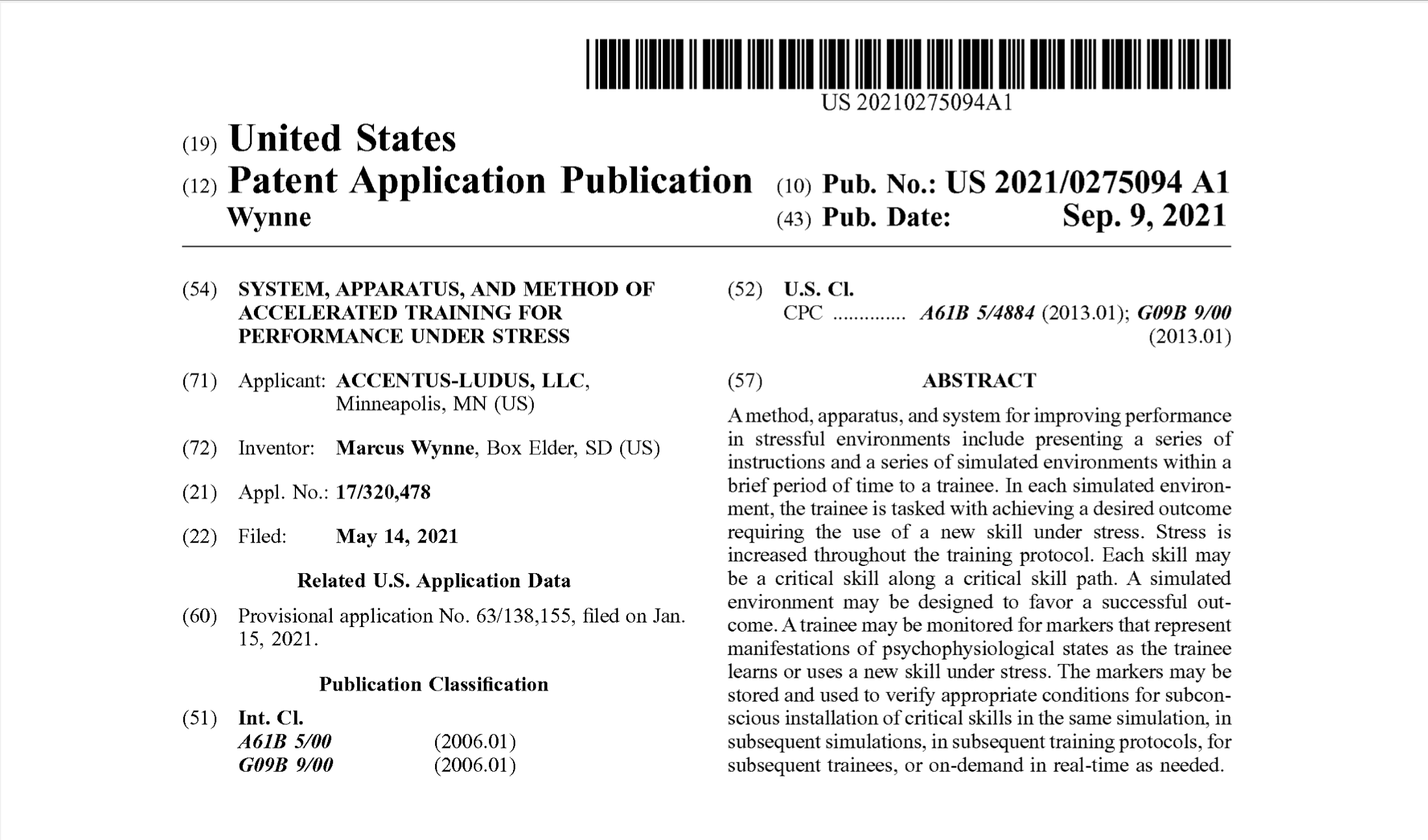One of my patents published last week. I’m putting it up here. Someone asked me why I would post an innovative and unique training protocol that’s been appraised in the eight figures (before the decimal point) for value. I quoted Elon Musk, who was asked a similar question when he shared details of his battery technology:
“It’s no good being the only one in the lifeboat.” Elon Musk
My tight knit instructor community, almost all active duty Tier One operators and a handful of others, and I, have saved many lives with our training over the last thirty years. While we are in business to license and automate our methods, we are committed in a larger sense to making the world a better place. Producing people who not only survive but thrive under extreme onset threat to life stress contributes to making the world a better and safer place.
That’s a big deal in the VUCA (Volatile, Uncertain, Complex, Ambiguous) world we live in.
Me and mine have skin in the game. Blood, sweat, and tears. Not all of it our own.
So what raises my boat raises all boats. What we use to save lives may save others we don’t know about.
And our lawyers tell me it’s the best way to get our innovation out in front of financiers, investors, and other developers who can help build something that’s bigger and better than we can do on our own.
There is no I in Team, right?

Definitely not at BURNING MAN
So that’s that.

I was selected as a sole source provider for NASA’s Astronaut Training Program to do an evaluation of the Astronaut Training Program. My job was to see if we could accelerate the training program, minimize the time investment while ensuring the same or better performance metrics, and offer suggestions on how to improve the existing curriculum. Part of that mission was to examine how well the training program, which grew out of the “Right Stuff” elite military test pilot training schools, served the new flow of civilian mission specialists who often had no military or high-stress performance background.
I’ve been watching with interest and excitement SpaceX’s first civilian astronaut crew on their inaugural launch this past week. I’ve read about their training program and how they’ve relied on NASA to provide that. I wonder how well that training serves a truly civilian astronaut student base that doesn’t draw primarily from military and aviation personnel. One point I raised with NASA was the importance of a creative problem solving mind-set and selecting for and training that mental attribute. The emergency procedures I observed were drawn from the military and aviation checklist paradigm. That’s a valuable paradigm. However, it doesn’t leave much room for creative “off the checklist” problem solving.
The problems that will emerge in long duration space flight will call for creative and outside of the box thinking.
Why?
Because we don’t know what we don’t know. We have not yet experienced problems unique to long duration manned interplanetary missions because we haven’t done those missions yet. We have experience in long duration manned ORBITAL missions. We have some short out and back moon missions. Some problems we can anticipate and simulate.
And some we won’t know about till we encounter them in real time.

“Space…the final frontier…” Gene Roddeberry, creator of STAR TREK.
Interplanetary space is where the real problems will emerge. And the further out we go, the more tenuous the communication with Ground Control and the pool of expert problem solvers on the ground.
So who’s going to solve those problems?
Logical and intuitive problem solvers who can work under extreme stress in an extreme and hostile environment. Who can solve life threatening issues in real time. Problem solvers who have been selected and trained for their ability to solve problems, not just follow checklists, who can create real time solutions that will work because they MUST work.
Because lives depend on those solutions.
People like the ones me and mine design training for.


